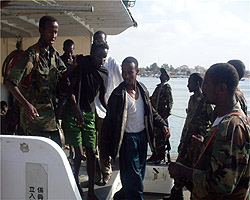On April 8, Somali pirates attacked a U.S. ship and took Captain Richard Phillips hostage. He was held for five days before the U.S. Navy rescued him. The incident focused the attention of the world on the growing problem of pirates operating from the African country of Somalia.
Somalia is located on the east coast of Africa, near one of the world’s busiest shipping routes. The country is extremely poor, and fighting amongst clans led by warlords makes it a dangerous place to live. Somalia has not had a stable government since President Siad Barre was overthrown in 1990. There are very few jobs available, and more than half of the population requires food aid to keep from starving.
These problems have led to a surge in piracy in Somalia. The pirates use fast ships, sophisticated weapons, and high-tech gear to attack ships in the waters off the Somali coast. They board and take over the ships, then sail them to the Somali coast, where they hold the crew hostage until the crew’s home country or the company that owns the ship pays a ransom to the pirates. Without a stable government in Somalia, it has been difficult to stop or capture the pirates.
U.S. Secretary of State Hillary Clinton announced that representatives from 24 countries would meet in May to discuss new strategies for dealing with the piracy problem. The strategies are expected to include bringing captured pirates to court and seizing their assets.
Image credit: AP Images
Related Links
- Piracy Symptom of Bigger Problem
Story from the BBC on the Somali pirates and how the problems within Somalia have fueled pirate activity. See also links to other BBC stories on recent piracy.
(Source: BBC, April 15, 2009) - U.S. Navy Rescues Captain, Kills Somali Pirates
On April 12, the U.S. Navy attacked three pirates who were holding Captain Richard Phillips hostage on a lifeboat after they threatened the captain with a gun. All three pirates were killed. Captain Phillips was rescued unharmed.
(Source: Reuters, April 12, 2009) - FACTBOX: Somali Pirates Risk Choking Key World Trade Route
Somali pirates hijack ships coming to and from the Gulf of Aden, one of the world’s busiest shipping routes, with nearly 20,000 ships passing through each year.
(Source: Reuters, April 15, 2009) - Map of Somalia
Map of Somalia from the United Nations. Includes a locator globe, the Indian Ocean, and the Gulf of Aden.
(Source: UN, January, 2007)
Critical Thinking Questions
- Summarize Read about the attack on Captain Phillips’s ship by pirates. How did the crew react to the attack, and what did the captain do to keep the rest of his crew safe?
- Causes and Effects Name three problems faced by the citizens of Somalia and describe how they might have contributed to the piracy problem.
- Form and Support Opinions Some experts believe that paying ransom to pirates for the safe return of hostages contributes to the problem by causing more acts of piracy in the future. Do you think that governments and shipping companies should pay ransoms to the pirates, or should they refuse? Why do you think so?





How have these pirates been dealt with in the past? They have been coddeld, their demands met, their victims forbidden to fight back, their non-existent “right” to live by kidnapping and stealing from others protected. They were dealing with doormats who treated them with kid gloves. Finally, they ran into the Russians, who do not handle things that way. Had they been dealt with appropriately in the past, the might not have found themselves in this position. Expect to see more such incidents in the future, because the coddling, appeasing, excuse-making, and evasion continues on a massive scale and the outrages will continue until someone takes equally outrageous action to stop them.Am I bothered by this? Not half as much as I am by seeing people I admire and respect being savaged by the the invertebrates of the MSM and the Left establishment for stating the truth and standing up for freedom. This is not the time to flinch.